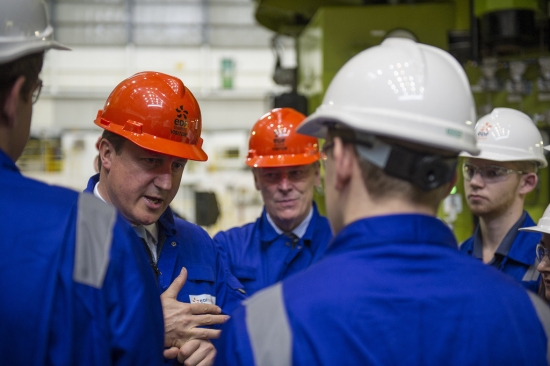The government yesterday gave the go ahead for the UK’s first nuclear power station in a generation to be constructed in Somerset. The £16 billion Hinkley Point C scheme will be largely financed by France’s EDF, along with a consortium of investors from China – making this the first British nuclear station built without the assistance of the taxpayer.

David Cameron speaks to EDF workers at Hinkley Point
Prime Minister David Cameron spoke of his delight at the successful conclusion of negotiations, which have been ongoing for several months as government ministers and EDF attempted to strike a deal deemed agreeable to both parties.
He said; “As we compete in the tough global race, this underlines the confidence there is in Britain and makes clear that we are very much open for business.
“This also marks the next generation of nuclear power in Britain, which has an important part to play in contributing to our future energy needs and our longer term security of supply.”
At present, it is estimated that Hinkley Point C will be completed and ready to become operational in around 10 years, as the dual nuclear reactor set up will take some time to prepare.
Yet the news may not be entirely good for consumers, as the minimum price of the energy produced at the site has been fixed at almost double the current wholesale price for electricity for the next 30-40 years.
However, the fact remains that energy prices are already consistently climbing as firms worry about shortages, meaning that this cost may well not be too unreasonable in ten years’ time.
This is the view of the Confederation of British Industry’s Director General Jon Cridland, who claims the reliability of the nuclear supply will give businesses peace of mind and will prove less costly than losing business due to power shortages.
He says; “It’s important to remember this investment will help mitigate the impact of increasing costs.
“The fact is whatever we do energy prices are going to have to go up to replace ageing infrastructure and meet climate change targets – unless we build new nuclear as part of a diverse energy mix.”
Opposition leader Ed Miliband, who has pledged to freeze energy prices for 20 months if Labour wins the next election, is not opposed to the development, but took the opportunity to attack the government’s failure to address the issue of spiralling gas and electricity bills.
“We’ve got the prime Minister who says he can fix prices for 35 years ahead for the energy companies but he can’t freeze prices now for the consumer,” he said.
The announcement has been welcomed by the construction industry which says the development will create thousands of building and engineering jobs. These will include specialist and technical roles alongside management and apprenticeship positions.
Previous Post
Britain is still World Leader in Retail